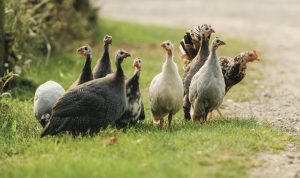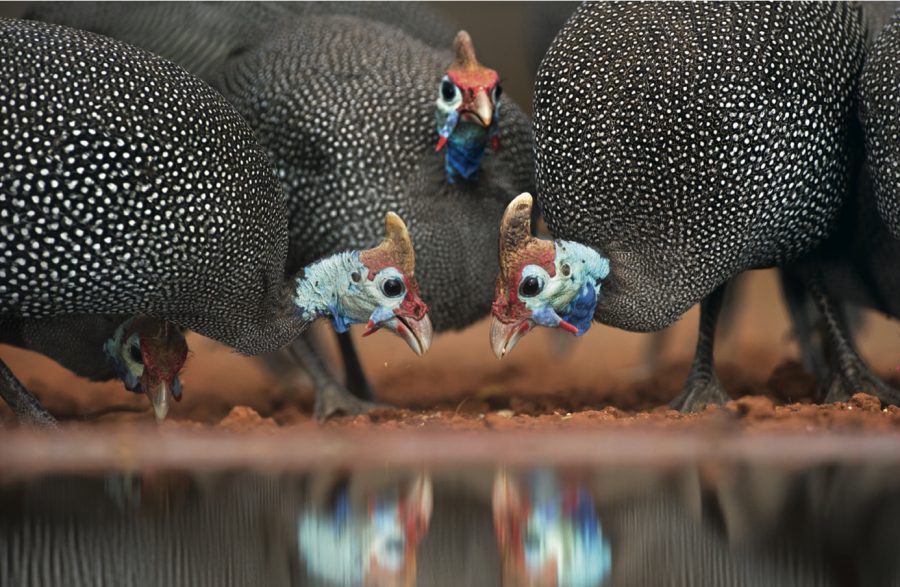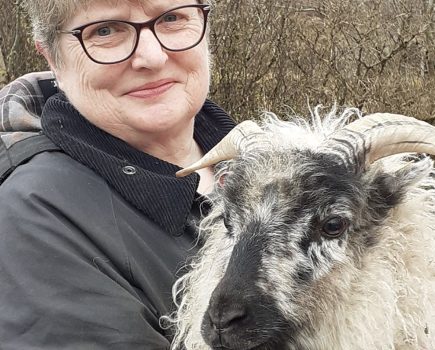Felicia Harris shares her experiences of these unique birds from her farm in the United States.
Raising Guinea Fowl is one of the most unique experiences I have had on my farm. Caring for these unique birds has shown me many positive aspects about them that can benefit landowners worldwide. Let me share with you seven facts about Guinea Fowl that I have discovered while owning my Guineas for five years.
1 – GUINEAS TRAVEL IN PACKS
They are like a pack of wolves, in terms of sticking together. When we first got our Guineas, they would run around our six acres together. If you saw two, you knew all the others were close by. It looks quite interesting seeing large-sized birds all gathered in one place and running around together. On occasions, they will separate and have two different groups. But they are always with one another. You will not find one standing alone unless it is nesting or injured.
2 – GUINEAS LAY EGGS IN HIGH GRASS
No matter how much you try to create a nesting place for your Guineas, they will avoid it and find a place of their own. I put boards against the house, bought nesting boxes and put them in obscure places and even put hay in a dark corner. They would not use the homes I built for them. Guinea hens are very particular about where they nest. I always find a ton of their eggs in high grass.
3 – GUINEA FOWL EAT A LOT OF BUGS
The reason I bought Guineas is because I met a guy in a feed store who told me that he had fifty Guineas. I said, “Fifty guinea pigs!” He shook his head and laughed. Then, he told me that he had fifty Guinea Fowl and how they clear his acres of bugs in no time.
Since I had just purchased my property and am not fond of bugs at all, I ordered thirty guineas. I often see my Guineas catching moths, crickets, grasshoppers, and creepy crawlers. I have read that their favourite bug is the mite. Since mites are so small, I have not personally seen them eat one; but my dogs seem totally free of mites with my Guineas around.
Did You know? Guineafowls are considered omnivores. This means they will consume plant and animal matter as part of their diet
4 – GUINEA EGGS ARE DELICIOUS
When I first bought my guineas, I did not think about their eggs. I owned Guineas strictly for keeping down the bug population. My husband and I were a little apprehensive about eating Guinea eggs at first because we were new to the farm life and new to owning Guinea fowl. So I did a bit a research online and read about how scrumptious they were, and then we were ready to try them.
Their eggs have more yolk than regular chicken eggs, and they do not have much of the chalazae (stringy white particle prevalent in chicken eggs) or any of those red spots that you may find in your fresh chicken eggs. In my opinion, you will get the most distinguishing taste of a guinea egg when you hard boil it. The guinea egg is quite creamy when boiled. Perfect to put in your tuna fish or side of potato salad.
Did You Know? You can put fertile eggs under tight sitting bantam broodies to hatch, but they will be a lot smaller than chicks when they hatch
 5 – GUINEAS ARE FRIENDLY
5 – GUINEAS ARE FRIENDLY
Not friendly like chickens. But that really depends on how much physical contact you have with them when they are young. I do not handle mine at all. Guineas are not as tame as chickens; you cannot just walk up to them and grab them. They will run. If you keep chasing them, they will take off and fly. They can fly very well and far although flying is not usually their chosen means of travel, except at night when they get up into high trees to roost away from predators.
When my Guineas were young, I gave them peanuts for treats. Now whenever I go outside, they run up to me to see if I have any in my pocket for them. I usually do and toss them a few to their delight.
Guineas can also recognize you and will come to you if they think you have a treat for them. But catching them is out of the question. It is dangerous to have them in closed, tight quarters and then try to catch them. They have sharp claws. And, if you back them in a corner, they will use them to get away.
I knew a lady that had a Guinea in a shed and let her young son go into the shed to give it a snack. Her son almost got his eye scratched out because she assumed her Guinea had the same placid temperament as some chicken breeds. The Guinea felt threatened by the child, couldn’t get away and reacted out of fear.
Guineas are basically wild birds. They are not like pets that enjoy a nice cuddle or hug. The only way that I have learned to catch them is to throw a blanket or cloth on top of them and grab their bodies. Their feet are sensitive and can get injured easily. So, it is never a good idea to grab them by their feet. Once a cloth is thrown over them, they will stop in their tracks because they cannot see in the dark.
Guineas are not the friendliest birds in the animal kingdom; but they are reliable and will stay on your property and do their job.
6 – GUINEAS MAKE NOISE
Some people think that Guineas make a lot of noise and to be fair, are probably not a great idea if you have nearby neighbours. In my opinion, it is just average unless they are sounding an alarm or communicating with each other. They are brilliant in letting you know that unwanted intruders are on your property.
When they used to perch in the tree in front of my house at night, whenever a car drove by, they would chatter. They let me know someone was driving down the street or walking on the road. I found that very useful.
The females make a two-syllable chatter and the males make mostly one-syllable chatter. That is how I determine the sex of my guineas. Also, females chatter more than the males, go figure, right!
Every now and then a Guinea hen will sit on the fence and chatter rather loud, but I figure that it is her way of keeping the flock together. Most of the time the other Guineas will gather in a close distance of the hen that is making the loud chattering noise. Also, if they see an owl or hawk, they will chatter loud like a horn, the awkward sound you hear will inform you that they are in danger.
One night they were in my tree at about midnight. I heard them chatter loudly, I looked outside and there was an owl on the fence next to the tree that they were in. They cannot see at night. So, they were vulnerable and in danger. I went out with a cow bell and scared the owl away.
On a different night, that owl managed to get one of my Guinea hens. But they are smart (contrary to most people’s opinions online), because after that incident they found their way in my garage, where they are away from predators. Now every night they go into the garage and sleep on the shelves we set up for them.
Since they are in the garage instead of outside at night, I clean my garage out more often. But that is a small price to pay for their safety.
7 – GUINEAS MAY LEAVE AND FORM A NEW PACK
When we first picked up our Guineas from the post office, we were excited and wanted to do everything we could to keep them safe. When they got older, we let them out the shed. But they kept flying off the property.
My husband would grab some peanuts and go down the road and lure them back. He literally looked like the Pied Piper, him walking backwards and the Guineas following him as he was tossing peanuts from his hand.
He did this for a while. Then we became annoyed that they would wander off each day. So, he just quit chasing them down because it had become time consuming and sometimes dangerous.
When we quit trying to lure them home; every night they would come back. They would pace at the fence until we opened it. By dusk they were all in the garage on the top shelves. That is how they found their new homes.
However, we have noticed half our guineas have moved down the road to a neighbor’s yard and have made new families of their own. So, some of your guineas may leave and some will stay. But, do not get worried, they know how to take care of themselves.
These are just a few facts I have learned by owning Guineas. If you have the space to for them, I recommend getting a few guineas to see how you like them. They are wonderful to watch, easy to care for and a great benefit to your land and animals.
|
ALL ABOUT FELICIA HARRIS |
|
Felicia Harris is married with two adult daughters and she lives in Texas, USA. As well as enjoying raising livestock, gardening and reading, she writes for several magazines including ‘Acres’ and ‘Self- Reliance’ |
More content like this can be found in The Country Smallholder magazine. Subscribe here.
For FREE updates from the world of smallholding, sign up for The Country Smallholder newsletter here.








